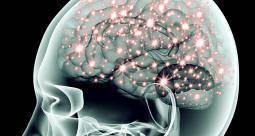Specific Set of Nerve Cells Control Seizures
Specific
Set of Nerve Cells Control Seizures
Epilepsy is a complex
disease with diverse clinical characteristics that preclude a singular
mechanism. One way to gain insight into potential mechanisms is to reduce the
features of epilepsy to its basic components: seizures, epileptogenesis, and the state of recurrent unprovoked seizures
that defines epilepsy itself.
The difference between
seizures and epilepsy is commonly confused. The two are not the same. Epilepsy
is defined by a state of recurrent, spontaneous seizures. If one seizure occurs
in an individual, it may not necessarily mean that they have epilepsy because
the seizure may have been provoked and that individual may never have a seizure
again.
Reviewing some of the
basic principles in neurobiology can provide a framework to understand the
mechanisms of
- · seizures
- · Epileptogenesis
- · epilepsy
Scientists have
discovered that a little arrangement of nerve cells in the cerebrum controls
the weakening seizures
and psychological
shortages normal for the most widely recognized type of epilepsy in
grown-ups. This disclosure could prompt new and better medications.
The
Test:
 Test enactment of a little arrangement of nerve
cells in the cerebrum forestalls convulsive seizures in a mouse model of
fleeting projection epilepsy, the most well-known type of epilepsy among human,
as per an investigation by scientists.
Test enactment of a little arrangement of nerve
cells in the cerebrum forestalls convulsive seizures in a mouse model of
fleeting projection epilepsy, the most well-known type of epilepsy among human,
as per an investigation by scientists.
Conversely,
inactivating these cells, referred to neuroscientists
as overgrown cells, encourages the spread all through the cerebrum of the
electrical hyperactivity at first limited at a seizure's beginning, causing the
out and out behavioural manifestations of fleeting flap epilepsy.
Mossy cells are known
to be damaged easily as a result of head trauma and decreased blood supply. Such brain injuries, in turn, increase the
risk for temporal lobe epilepsy. The role of mossy cells in epilepsy has
perplexed neuroscientists for a couple of decades.
Developing drugs that
could bring therapeutic relief to people with chronic, drug-resistant epilepsy,
a debilitating condition that not only circumscribes patients' lifestyles and
occupational options but predisposes them to depression, anxiety
and early death.





Comments
Post a Comment